Regulations and Brochures for Junior Scholars
Doctoral- and Habilitation Regulations
- Doctoral candidates and habilitating institutionsHide
-
Doctorate or Habilitation at a Faculty:
- Faculty I - Faculty of Mathematics, Physics & Computer Science
- Faculty II - Faculty of Biology, Chemistry & Earth Sciences
- Faculty III - Faculty of Law, Business & Economics
- Faculty IV - Faculty of Languages & Literatures
- Faculty V - Faculty of Humanities and Social Sciences
- Faculty VI - Faculty of Engineering Science
- Faculty VII - Faculty of Life Sciences
Two graduate centers offer structured doctoral programs with their own doctoral regulations:
- BIGSAS - Bayreuth International Graduate School of African Studies
- BayNAT - Bayreuth Graduate School of Mathematical and Natural Sciences
Two graduate centers offer structured doctoral programs. The doctorate is awarded here in accordance with the doctoral regulations of the participating faculties:
- Faculty I - Faculty of Mathematics, Physics & Computer Science
- Doctoral regulationsHide
-
Here you can find all doctoral regulations of all doctoral institutions of the University of Bayreuth (only available in German).
- Habilitation regulationsHide
-
Here you can find all habilitation regulations of the faculties of the University of Bayreuth (only available in German).
Brochures for Junior Scholars
- Safeguarding Good Scientific Practice (DFG Memorandum)Hide
-
Safeguarding Good Scientific Practice
Following the approval of the DFG Senate on 14 March 2013, the recommendations for securing good scientific practice were approved by the General Assembly of the DFG at the DFG Annual General Meeting in Berlin. On its basis, the DFG is committed to ensuring good scientific practice as an essential prerequisite for scientific research Attaching utmost importance to work and as a core task of scientific self-control.
English translation starts at page 61
Download pdf, 112 pages, 1 MB
- Guidelines for Safeguarding Good Research Practice Hide
-
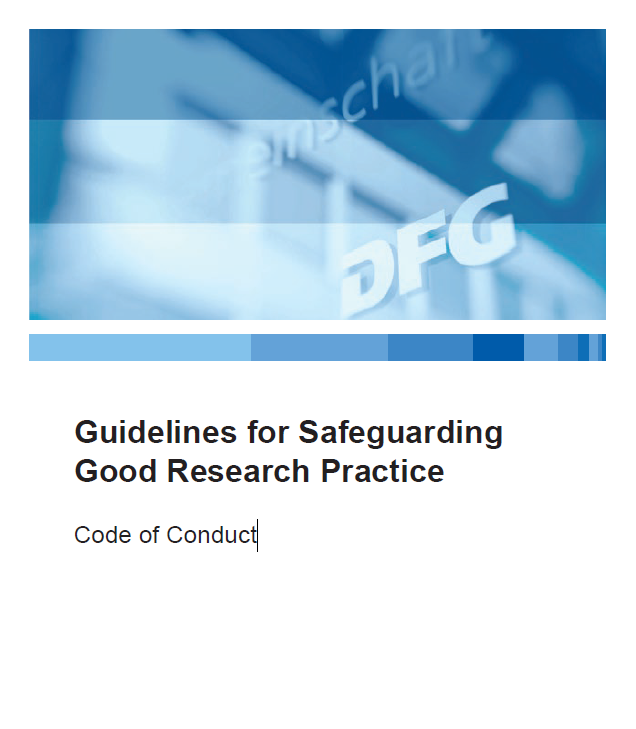
Code of Conduct - Guidelines for Safeguarding Good Research Practice
Download pdf, 31 pages, 0,8 MB
- Qualification programme of the WiN Academy and the University of Bayreuth Graduate School (only available in German)Hide
-
Qualification programme of the WiN Academy and the University of Bayreuth Graduate School
This brochure contains the offers from various institutions of the University of Bayreuth: UBT Graduate School/Win Academy, Centre for Teaching and Learning in Higher Education (ZHL), Writing Center, Equal Opportunities Department, Research Funding Unit and University Library, as well as references to other facilities which support doctoral candidates.
Download from the intranet pdf, 27 pages, 7.2 MB
- Doctorate at the University of BayreuthHide
-
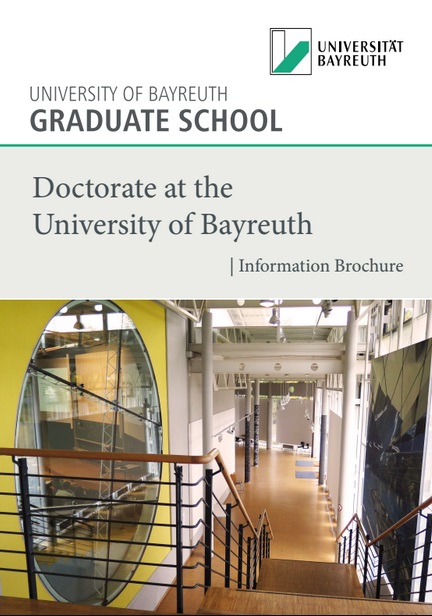
Doctorate at the University of Bayreuth
This brochure contains important information for doctoral candidates at the University of Bayreuth at a glance.
Download pdf, 40 pages, 3.3 MB
- Statute of the University of Bayreuth Graduate SchoolHide
-
Statute of the University of Bayreuth Graduate School
Downloaded here (Last revision: 2023, 16 pages, 0.2MB)
- Scholarship GuideHide
-
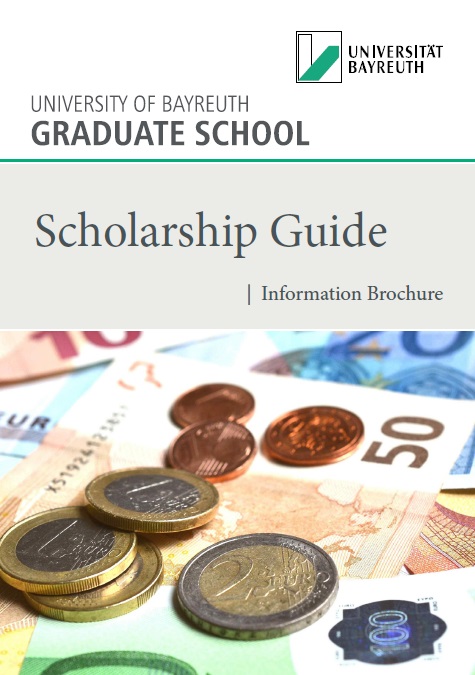
Scholarship Guide
This brochure has been put together by the University of Bayreuth Graduate School and aims to support doctoral candidates, postdocs and graduates striving to do their habilitation in their search for a suitable scholarship.
In Germany, a differentiated selection of scholarships is available. Here we have compiled, where possible, a comprehensive list of various scholarship opportunities as well as search portals. You will fnd offers available through the University of Bayreuth, as well as suggestions for other scholarship providers. In addition to classic scholarship opportunities, such as those supporting especially talented candidates, you can also fnd a list of feld-specifc and mobility scholarships. In addition, you will fnd information on printing cost stipends as well as the OpenAccess Publishing Fund of the University of Bayreuth. Should you aim to pursue a scientifc career after completing your doctorate, you will also fnd a list of suggestions for fnancing a postdoc and habilitation.
Download pdf, 24 pages, 3 MB
- QZP Guidelines for Doctoral CandidatesHide
-
QZP Guidelines for Doctoral Candidates
The conditions for doctoral candidates at many universities in Germany and Europe have improved considerably as a result of the development of a broad spectrum of measures related to supervision, support and qualifications, within the framework of structured doctoral training. The goal of structured training is the formation of an extremely attractive research environment for young researchers. This has been accompanied by changes in academic cultures and in the understanding of management within universities. The burdens of doctoral training are shared by offering new support programmes and involving new actors, such as the managing directors of graduate schools, professional trainers and mentors. Young researchers are provided with special support, particularly in the field of professional qualifications and management competence, and this makes it easier for them, together with their supervisors, to concentrate on the research itself.
The focal point of the whole process of pursuing a dissertation remains the candidate’s research performance and the supervisory relationship between supervisor and candidate. In some respects this has become even more important, because supervisors who have been relieved of some advisory duties can now concentrate more exclusively on the key responsibilities of supervision and support of the candidates’ research and also on the specialist qualifications their candidates are acquiring. The transparency of this supervisory relationship makes a decisive contribution to the success of the doctorate.
These guidelines are intended to help to make doctoral supervision even more efficient. They provide a kind of supervisory biography of the course of a doctorate, offering suggestions for the preparatory, research and completion phases and giving all those involved a clearer idea of the organizational questions, problems, technical details and support measures that come into play during the different phases. The goal of doctoral supervision is to provide young researchers with the best possible advice as they prepare to become highly qualified colleagues who are fully integrated into the academic community. This process will work best Preamble 5 if its requirements are equally transparent and comprehensible for both sides, if both sides define, communicate and document their reciprocal expectations and if they understand the doctorate as a project to be developed and fine tuned together.
This English translation of the guidelines aims at two purposes: Firstly, we want to help those international students considering coming to Germany or already pursuing their doctoral degree at a German institution. Secondly, at the international level we intend to contribute to the discussions and, even more important, to the progress on how to improve standards and transparency for doctoral supervision and careers. As our remarks and suggestions have been made from the point of view of the German system, at the inter-national level adjustments may be necessary to meet the specific requirements.
This paper is the result of a joint project set up by the Qualitätszirkel Promotion (Quality Circle for the Doctorate), a German network involving 11 graduate schools and institutions responsible for quality assurance and support for young researchers, belonging to 10 different universities from different federal Länder. The project sees itself as a forum for the discussion and further development of guidelines and materials, and so ultimately of quality standards for good doctoral supervision at the universities involved and elsewhere. We are aware that our guidelines must be adapted to the different universities and to the current situation of their specialist cultures. They therefore cannot be a patent remedy that will apply everywhere; rather, they are intended to provide food for thought, proposals and the hope and expectation that further discussions and joint measures will follow.
We are circulating our guidelines internationally, in both German and English, and we would be pleased to see as many people as possible using them for the optimization of doctoral supervision in their own institutions. We would also be happy to receive feedback, reports of your own experiences and suggestions for revision. We will be glad to circulate this new knowledge via the national and international networks.
Download pdf, 32 pages, 0.3 MB
- QZP Guidelines for SupervisorsHide
-
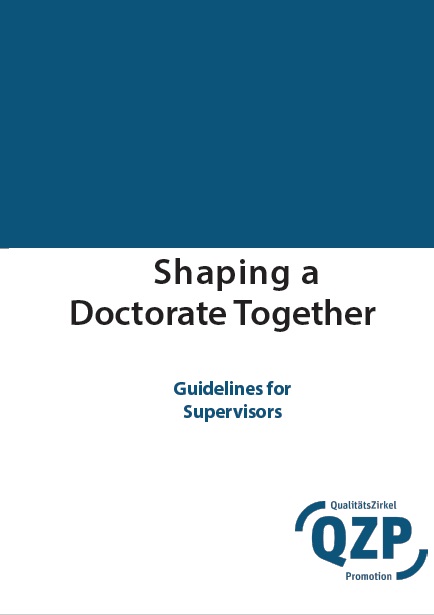
QZP Guidelines for Supervisors
The conditions for doctoral candidates at many universities in Germany and Europe have improved considerably as a result of the development of a broad spectrum of measures related to supervision, support and qualifications, within the framework of structured doctoral training. The goal of structured training is the formation of an extremely attractive research environment for young researchers. This has been accompanied by changes in academic cultures and in the understanding of management within universities. The burdens of doctoral training are shared by offering new support programmes and involving new actors, such as the managing directors of graduate schools, professional trainers and mentors. Young researchers are provided with special support, particularly in the field of professional qualifications and management competence, and this makes it easier for them, together with their supervisors, to concentrate on the research itself.
The focal point of the whole process of pursuing a dissertation remains the candidate’s research performance and the supervisory relationship between supervisor and candidate. In some respects this has become even more important, because supervisors who have been relieved of some advisory duties can now concentrate more exclusively on the key responsibilities of supervision and support of the candidates’ research and also on the specialist qualifications their candidates are acquiring. The transparency of this supervisory relationship makes a decisive contribution to the success of the doctorate.
These guidelines are intended to help to make doctoral supervision even more efficient. They provide a kind of supervisory biography of the course of a doctorate, offering suggestions for the preparatory, research and completion phases and giving all those involved a clearer idea of the organizational questions, problems, technical details and support measures that come into play during the different phases. The goal of doctoral supervision is to provide young researchers with the best possible advice as they prepare to become highly qualified colleagues who are fully integrated into the academic community. This process will work best Preamble 5 if its requirements are equally transparent and comprehensible for both sides, if both sides define, communicate and document their reciprocal expectations and if they understand the doctorate as a project to be developed and fine tuned together.
This English translation of the guidelines aims at two purposes: Firstly, we want to help those international students considering coming to Germany or already pursuing their doctoral degree at a German institution. Secondly, at the international level we intend to contribute to the discussions and, even more important, to the progress on how to improve standards and transparency for doctoral supervision and careers. As our remarks and suggestions have been made from the point of view of the German system, at the inter-national level adjustments may be necessary to meet the specific requirements.
This paper is the result of a joint project set up by the Qualitätszirkel Promotion (Quality Circle for the Doctorate), a German network involving 11 graduate schools and institutions responsible for quality assurance and support for young researchers, belonging to 10 different universities from different federal Länder. The project sees itself as a forum for the discussion and further development of guidelines and materials, and so ultimately of quality standards for good doctoral supervision at the universities involved and elsewhere. We are aware that our guidelines must be adapted to the different universities and to the current situation of their specialist cultures. They therefore cannot be a patent remedy that will apply everywhere; rather, they are intended to provide food for thought, proposals and the hope and expectation that further discussions and joint measures will follow.
We are circulating our guidelines internationally, in both German and English, and we would be pleased to see as many people as possible using them for the optimization of doctoral supervision in their own institutions. We would also be happy to receive feedback, reports of your own experiences and suggestions for revision. We will be glad to circulate this new knowledge via the national and international networks.
Download pdf, 32 pages, 0.2 MB
- QZP Doing your doctorate - Making conscious decisionsHide
-

QZP Doing your doctorate - Making conscious decisions
The question "Do I want to do a doctorate?" is more complex than you might think at first glance. A number of aspects and questions need to be considered and weighed up before an answer can or should be given that ultimately sets the course for an entire stage of one's life.
With this brochure, we would like to help by explaining to you the requirements and prospects of a doctorate in such a way that the path to a doctorate becomes more transparent. It provides information on the framework conditions and the doctoral process, the time and personal requirements, as well as the career prospects after completing your doctorate. This should make it easier for you to answer the question "Do I want to do my doctorate?"
Download pdf, 56 pages, 0.4 MB
- Doctorate with a degree from a university of applied sciences (only available in German)Hide
-
Doctorate with a degree from a university of applied sciences
Information and practical examples for advising and supporting those interested in doctoral studies
Publisher: Hannover University of Applied Sciences and Arts
Project funded by the Federal Ministry of Education and Research and the European Social Fund with the following funding codes 01FP10121_01FP10122Download pdf, 33 pages, 5 MB (only available in German)
- Bayreuth-WiN-CertificateHide
-
The brochure for the Bayreuth-WiN-Certificate is available for download here (Intranet)
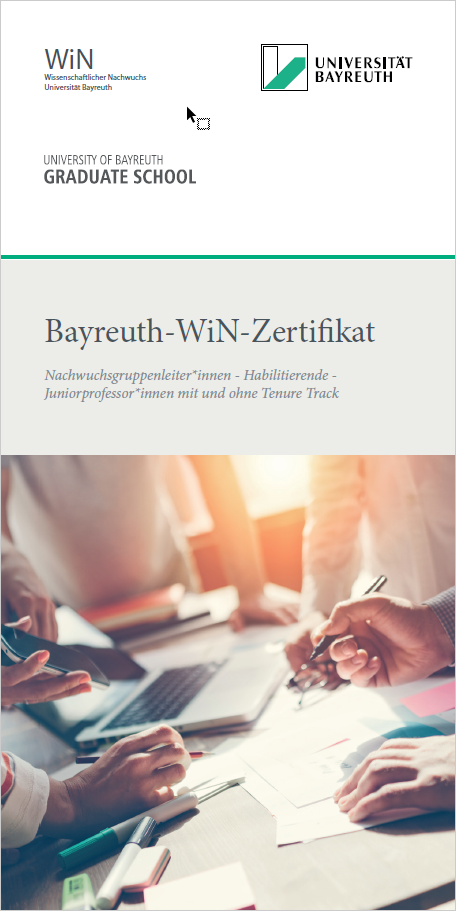
- Research certificate WiN-FundHide
-
The brochure for the WiN-Fund research certificate is available for download here (Intranet)
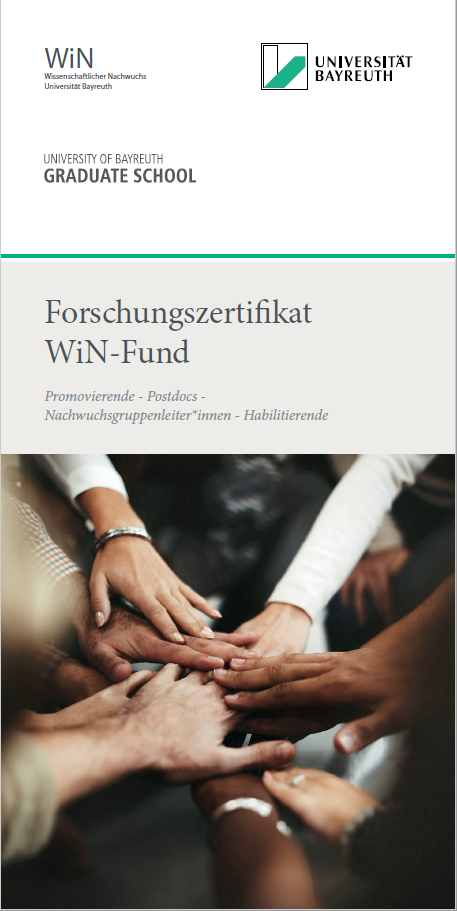
If you want to order printed brochures from us, just send us an e-mail.

